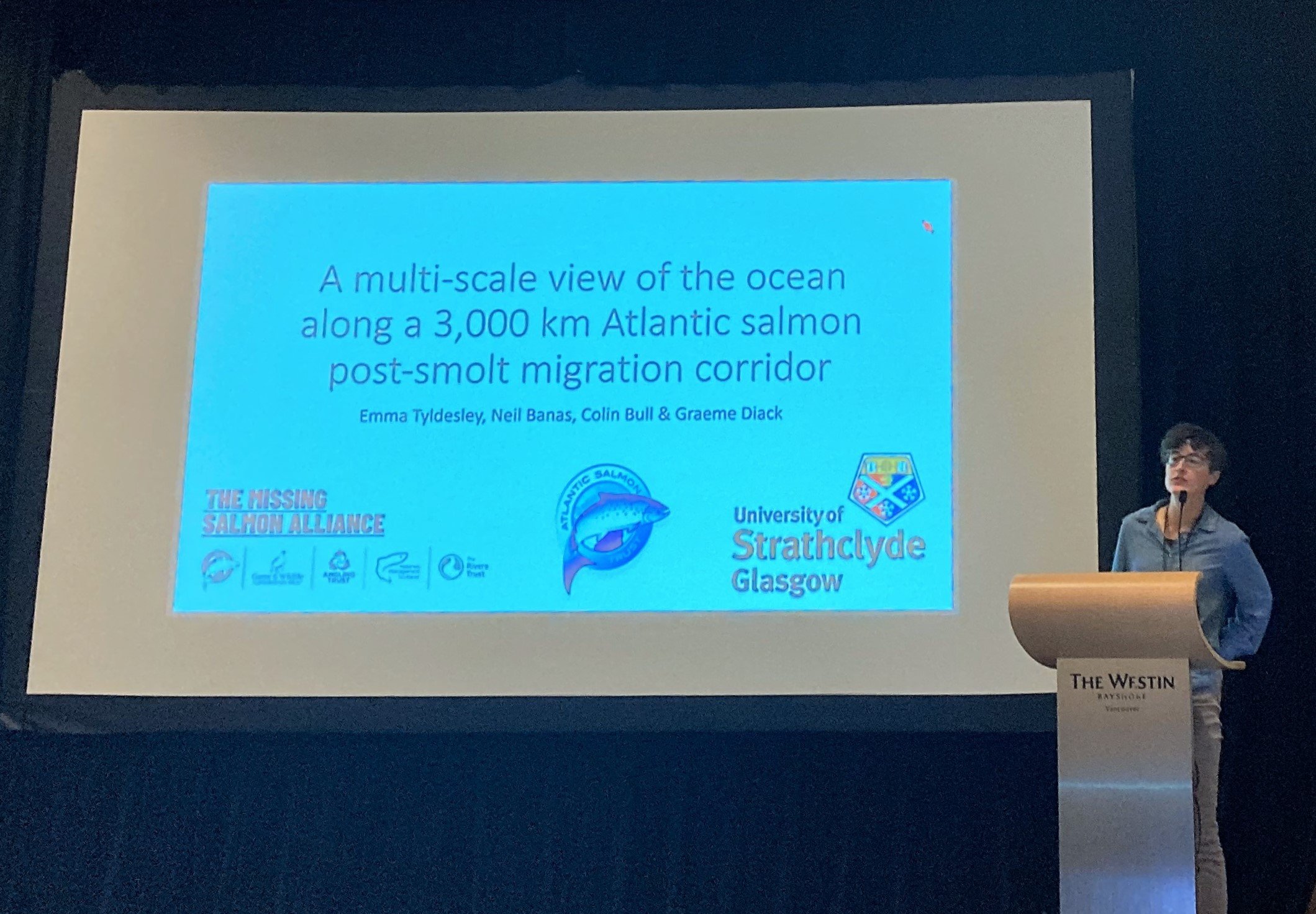Salmon Conservation: An International Collaboration
Earlier this month, Missing Salmon Alliance scientific experts visited Vancouver for the International Year of the Salmon (IYS) Synthesis Symposium; the culmination of over 13 workshops and symposia, three historic High Seas Expeditions and over 80 associated events across the North Atlantic and North Pacific basins.
MSA Principal Investigator, Colin Bull, at the IYS Symposium earlier this month
Here, they presented the latest results from our implementation study assessing potential drivers of marine mortality in Atlantic salmon, our online shared data library, and the development of our flagship project - The Likely Suspects Framework.
The Missing Salmon Alliance aimed to raise awareness of our work within the salmon science communities, learn from experts in the Pacific and Atlantic, and create collaborations across these spheres.
Commercial fishermen, anglers, indigenous groups, scientists, policy makers, and more came together to share key findings and experiences relating to salmon conservation. Each person present at the conference had their own connection to the species which is in rapid decline. For some, the salmon crisis is a scientific phenomenon, for others, it holds cultural significance.
The Symposium offered time and space for all those involved to consider alternative ways of viewing problems via the different ways that others interact with salmon. It was about engaging with a variety of people from a plethora of backgrounds all with one common denominator – the drive to conserve and protect salmon.
A deep sense of respect permeated the room as indigenous peoples engaged in conversations with scientists, scientists engaged with anglers, policy makers with commercial fishermen and so on, to learn from one another and discuss the future of salmon. Comfort zones were pushed, and while Western science has not previously had the capacity to do so, the aim now is to try to integrate these conversations and learnings into shared knowledge and management systems that can be used to guide future actions.
The MSA’s online data library, SalHub, offers an opportunity to drive this ambition forward.
The Symposium demonstrated that there are many challenges in common with both Atlantic and Pacific salmon. We are certain that the global connections and collaborations made between MSA scientists and other leaders in salmon conservation will be integral to the future of the species.
At the Symposium, MSA Principal Investigator, Colin Bull, spoke as part of the theme session ‘Examining the Likely Suspects: Developments in a Holistic Understanding of Salmon Marine and Freshwater Survival’ on Wednesday 5th October, presenting the oral paper ‘The Likely Suspects Framework for Atlantic salmon: cooperatively building the foundations for a life-cycle approach to guide future management’ (Colin Bull et al.).
MSA Principal Investigator, Colin Bull, presenting at the IYS Symposium
MSA Marine Data Modelling Scientist, Emma Tyldesley spoke as part of the theme session ‘Opening the Black Box: Advances in Understanding the Marine Phase of the Salmon Lifecycle’ on Thursday 6th October, presenting the oral paper ‘A multi-scale view of the ocean environment along a 3,000 km post-smolt migration corridor’ (Emma Tyldesley et al.).
MSA Marine Data Modelling Scientist, Emma Tyldesley presenting at the IYS Symposium
MSA Data Specialist, Graeme Diack, was also involved in a group whose synthesis paper ‘Improving Data Mobilization within the Salmosphere’ (Scott Akenhead et al) was presented by Tom Bird in the Information Systems session on Thursday 6th October.
Presentation slide for synthesis paper ‘Improving Data Mobilization within the Salmosphere’ (Scott Akenhead et al)
Pre-recorded presentations of collaborative research were also provided to the event from MSA partner organisations: Jess Rodger (The Atlantic Salmon Trust) presented on “The early phase of the marine migration of post-smolts from rivers across Scotland, England, Northern Ireland and Ireland” and Olivia Simmons (formerly of Game and Wildlife Conservation Trust) presented on “Influences of smolt body length on adult return rates of Atlantic salmon”.
Our European partners in the Game and Wildlife Conservation Trust led SAMARCH project also presented at the Symposium: Etienne Rivot (French National Research Institute for Agriculture, Food and Environment (INRAE)/Institut Agro) spoke as part of the theme ‘Changing Climate, changing status: Understanding shifts in salmon distribution, productivity and abundance under climate change’, and Marie Nevoux (INRAE/Institut Agro) presented on “Unraveling the demographic response of Atlantic salmon to a rapidly changing marine environment by the analysis of their scales.”
MSA Principal Investigator, Colin Bull, said “It was a privilege to be able to represent the MSA at this IYOS Symposium and make a valuable contribution to this international meeting. The breadth and scope of the presentations from across the many salmon species home ranges were both fascinating and enlightening to me. They brought home to me the similarities in challenges being faced across the salmosphere, as well as showcasing the huge collective groundswell of determination and hope to drive forward positive changes to safeguard these previous resources for future generations”
MSA Marine Data Modelling Scientist, Emma Tyldesley, said “I greatly appreciated this opportunity to present our recent results on drivers of salmon mortality at sea. It was useful to finally meet with the salmon research community in person rather than online. Collaboration and sharing of data and techniques will ensue! I was struck by the common challenges facing salmon in the Atlantic and Pacific. Hearing the experiences of indigenous salmon peoples was humbling and motivating.”
For more information, the programme of talks can be found here, and abstracts of presentations can be found here.
As an Alliance of six organisations, we will build on the existing work of our partners and maximise our impact by taking a coordinated approach and vital action in order to halt and reverse the decline of wild Atlantic salmon.
The goal of the Missing Salmon Alliance is to build an evidence-base to influence national and international decision-makers to regulate activities that adversely impact wild Atlantic salmon.
The Missing Salmon Alliance
The MSA is comprised of the following members:
Game & Wildlife Conservation Trust, Atlantic Salmon Trust, the Angling Trust with Fish Legal, The Rivers Trust and Fisheries Management Scotland.
https://www.missingsalmonalliance.org





